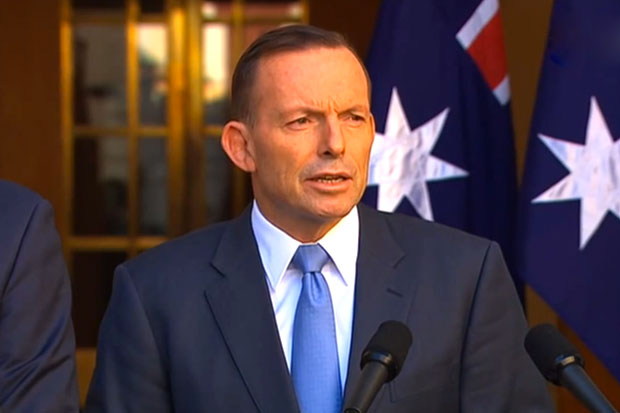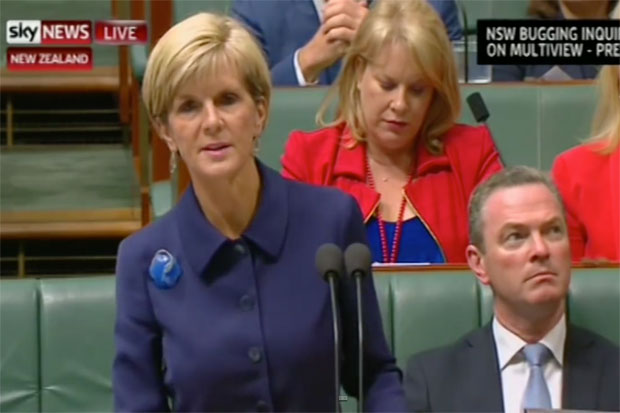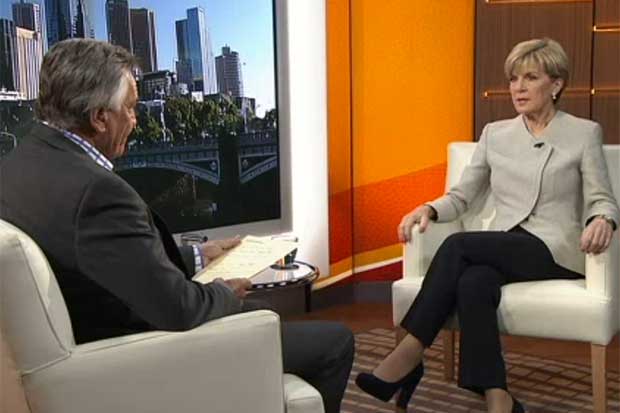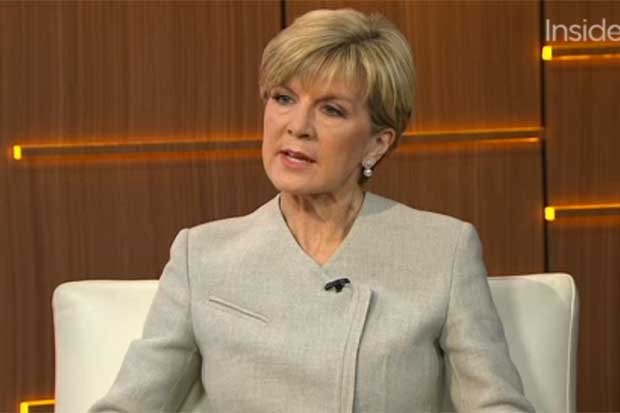How time flies. Close to a year ago, I observed that the justifications of our new invasion of Iraq were based on no substance, and consisted entirely of innuendo, fear and cheap sloganeering.
It’s interesting to review how the Abbott government has pursued the war, given that we’re set to expand it soon.
Back in simpler times, Tony Abbott was the leader of the opposition. On September 1, 2013, Abbott was confronted with the likelihood of the USA bombing Syria, in response to allegations that Assad had used chemical weapons. Abbott observed that this was a “civil war… between two pretty unsavoury sides”. He then created the endlessly mocked sound bite: “It is not goodies versus baddies, it is baddies versus baddies and that is why it is very important that we don't make a very difficult situation worse.”
This was reductionist, in the sense that there was – and continues to be – more than two sides fighting in Syria. Yet as far as policy goes, this was actually reasonable, in that he was cautious about getting involved in a war. The ABC reported that Abbott wanted Australia to play a diplomatic role in the conflict, leaving military intervention to the US, France and the UK.
Then Shadow Foreign Minister Julie Bishop was stuck with defending her wise and articulate leader. She bravely did her best. She gamely explained that “Both President Obama and Prime Minister Cameron have used the phrase "the bad guys" in the past; in fact David Cameron has said of Syria [that]the rebel forces in Syria include, quote, ‘a lot of bad guys’”. So rather than common stupidity, it appeared the leaders of the white and English speaking imperial alliance had tried to align their talking points. Alas, Abbott had over-simplified them.

Bishop then went on to observe, “On both sides of this conflict there are the bad guys, which is why it’s difficult for the US and its allies to take sides. Neither side is without blame. The rebel forces, for example, include Al Nusra, an Al Qaeda associate and a designated terrorist organisation.” Which was reasonable enough, and among the good reasons why Australia shouldn’t get involved in a war on the other side of the planet.
However, playing the role of a good ally, Bishop hedged her observation that there are “no easy choices or good options when it comes to Syria”, by also claiming to detect a “case for a legitimate and proportionate response” to Assad using chemical weapons.
Back then, the idea was that Australia would support attacks on Syria against Assad.
Fast forward a year. The goal was to invade Iraq, and only Iraq. Abbott reportedly stressed that the “specific objective” was to drive Daesh out of Iraq. It wasn’t to create a “liberal pluralist democracy”, just to ensure the Iraqi government and Kurdish regional government would be secure.
Obama was planning to also bomb Syria – because America can’t get enough of bombing Muslim countries – and so naturally, journalists asked if we were also going to join in that war, as we tend to follow the US in its military adventures.
Tony Abbott said no. But not a ‘forever no’: “It’s not an intention that Australia currently has…. Obviously, the legalities of action in Iraq, with the full permission and the cooperation of the Iraqi Government, are quite different from action in Syria which is essentially an ungoverned state with a government that we don’t actually recognise.”
Abbott commented that attacking Syria hadn’t “been ruled out”.
Meanwhile, the selective captain of freedom himself, Attorney General George Brandis informed us that it’s not really “correct” to describe the war as a war, “It is essentially a humanitarian mission with military elements”.
Somehow, this comment hasn’t earned the ridicule it richly deserves, presumably thanks to the general poverty of political discussion of foreign affairs in Australia.
Which brings us to this year, and our foreign minister, who has brought even more gravitas to foreign policy discussions than Abbott had portended in 2013. In April, Bishop gave a not entirely impressive speech about the war on Daesh.
In June, Bishop gave a talk to Chabadniks. Naturally, she was expected to say how great Israel was to her audience, eagerly anticipating the words of a foreign minister who had shown her general servility to the Israeli government.

Bishop didn’t entirely fall into line. Predictably, Bishop “utterly and absolutely” condemned the pernicious boycotts, sanctions and divestment movement. Yet it seems that in an earlier draft of her speech, she considered adding some critical comments.
She later softened them to the point that the criticisms are only hinted at. So Bishop tentatively began by observing Australia supports Israel, and will continue to do so, at the United Nations and presumably elsewhere. But it is “also a sign of our close friendship that we can be frank and honest with Israel”.
And what kind of frankness and honesty would Bishop exhibit? This tacit, if not passive aggressive hint: “We believe that Israel, no matter what the political stripe of the elected government, must remain committed to, indeed, actively pursue, a two-state peace settlement.”
That’s it. No comments on the current government winning an election by flatly rejecting a two-state agreement in principle.
There were other hints showing Bishop’s speech-writer’s inclination to hint at some disapproval of the Israeli government. For example, amidst much waffle, Bishop said that the “status quo is not acceptable”. Why not? Australia “encourages both Israel and the Palestinians to refrain from steps that damage the chances of reaching an enduring settlement.”
What steps by Israel might damage those chances?
It appears that Bishop intended to say some things that were frank and honest about Israel, removed them, and then forgot to remove the warning about how frank and honest she was about to be.
Bishop then explained the comparative worth of the two peoples: “The Israeli people deserve the right to live normal, productive lives free from fear of rocket attacks and terrorism. Just as the Palestinians have legitimate claims to their own homeland and secure borders.”
Note how Bishop defends the rights of Israelis – which she does at other times in the speech too (“Israelis have the right to live within secure borders, in peace and security”), but the Palestinians don’t have rights, they just have a legitimate “claim”.
This isn’t Bishop’s invention, and is actually reasonably common in Zionist political discourse. Israelis have rights, Palestinians have something else, which aren’t quite so pressing or important.
For example, there’s the case of Liam Getreu, Executive Director of the New Israel Fund Australia, the closest Australia comes to a large liberal Zionist organisation. Getreu downgraded Palestinians to merely having a “well-defined desire for statehood”.
Bishop also discussed Iran. It is not clear why she visited, and we may not know for another 30 years, till the internal archives are opened. I suspect part of the answer is to show that Australia, as a loyal servant of the US and part of the West, would welcome Iran back into the international fold in exchange for striking the deal on Iran’s nuclear program.
Bishop defended the preliminary agreement with Iran to the audience. She reassured them that “Australia’s sanctions against Iran, both United Nations and autonomous, remain firmly in place”.
She explained that the reason for the visit was because of our “vital interests in the region”, but only mentioning the issue of Iranian asylum seekers that Australia doesn’t find to be refugees. She didn’t mention Daesh, presumably because of the embarrassment of telling her Jewish audience she was working with Iran against it.
Which brings us to Bishop’s latest foray into discussing foreign policy, on Sunday this week. As noted, Abbott has previously said he’s not sure of the legal basis for invading or bombing Syria without the Syrian government’s consent. Note also that previously we were going to bomb another side in the Syrian civil war, and have now seamlessly transitioned to considering bombing a different side.

Bishop observed that Australia was “already involved in the air strikes over Iraq”, and crowed over killing some “senior commanders” of Daesh. What would be the legal basis for bombing Syria?
Well… It was “laid out” by the US. Which is not an entirely impressive response – we’re going to war with another country because the US says it’s fine.
Bishop noted again that the Coalition was “invited into Iraq” by the Iraqi government, and “under the principle of collective self-defence of Iraq and its people, the Coalition have extended that self-defence into Syria”.
She explained that “the border between Syria and Iraq is no longer governed. Neither the Assad regime in Syria, nor the Abadi regime in Iraq, has control over that border.” Precisely why this confers additional rights on Australia isn’t exactly clear.
Barrie Cassidy asked if that meant Syria doesn’t need to also invite in Coalition forces.
Bishop: “Well it's a very complex legal situation because of course the Assad regime is not recognised as legitimate by the United States or the Coalition, but the US, Canada, Jordan, the UAE are taking part in these air strikes.”
And she’ll get legal advice. Which is a little underwhelming, given that Abbott seems to have already indicated we’ll join in this expansion of the war anyway.
So far, the case for bombing Syria too seems to be that other countries like Jordan and the United Arab Emirates are doing it, and that there are a few countries in the world that don’t like the Assad government as well.
Cassidy, to his credit, got in a very good dig at the foreign minister, observing that Tanya Plibersek had said Australia should drop food, not bombs on Syria. Bishop responded by saying this would be supporting a “terrorist picnic”, explaining that “dropping food into Syria is likely to play into the hands of the terrorists… and the likelihood of being able to target food parcels into Syria was pretty naive”.
It’s a rather bold claim about the apparent danger of trusting any Syrians anywhere in Syria. Or perhaps a dire analysis about how badly the war is going.
Cassidy responded by asking “if you can't accurately target food parcels, how can you accurately target bombs?”
Bishop replied with Sarah Palin levels of insight and relevance:
“Well, I don't believe that the fighter jets should be used to drop food parcels. So, my belief is that the fighter jets should be used to take out Da’esh, that is causing so much misery and violence and brutality and taking territory off sovereign nations. What Tanya Plibersek does is she says that she supports the Labor position, the Coalition position, but then she always moves a little bit to the left and has a slap at Bill Shorten on the way through. So it's something she's been doing for quite some time…”
There are good reasons not to expand the war – and indeed, not to be in it in the first place. But the distinction between the invitation by al-Abadi and non-invitation by Assad is a rather specious one.

Some readers might be under the illusion that Iraq is a sovereign democracy, as created by the invasion in 2003. They had a Prime Minister called Nouri al-Maliki from 2006-2014. What happened to him? After the stunning successes of Daesh in 2013, the US decided that they didn’t like him anymore. According to journalist Eli Lake, President Obama began “pushing for regime change” in Iraq in late June 2014. By September, al-Maliki was gone – it just took a few months to topple the elected leader of the democracy we so proudly went to war to install.
A US official told Lake: “We have been working very quietly on the ground and sending messages to various parties that [Haider] al-Abadi is a viable alternative”. And guess who the new Prime Minister of Iraq is? The man who just happened to be Washington’s “preferred candidate since late June to replace Maliki”.
A US official explained, “We think he will govern better for the Iraqi people and we will be able to work with him.” And if the US doesn’t like him, they’ll pick a new Prime Minister for Iraq. That’s the precious democracy we’ve so selflessly bestowed on Iraq.
The Coalition government’s distinction between war on Iraq and war on Syria is based entirely on the theory that an invitation by the puppet government of Iraq is totally legitimate, whilst some sort of creative excuse needs to be found for invading Syria.
Whilst the government doesn’t recognise the legitimacy of the Assad government – and somehow, this justifies bombing Syria – it recognises the legitimacy of the al-Abadi government. It seems installing a government to do our bidding and obey our commands in the war doesn’t raise any questions.
Perhaps if the Syrian rebels declare a state, we can recognise it as the legitimate state of Syria and invite ourselves into that war on the same basis as the invasion of Iraq.
In the meantime, we can await the legal advice that will soon be used to justify Australia expanding the war. I’m sure the advice will be as intelligent and well thought out as the rest of Julie Bishop’s comments on foreign policy.
Donate To New Matilda
New Matilda is a small, independent media outlet. We survive through reader contributions, and never losing a lawsuit. If you got something from this article, giving something back helps us to continue speaking truth to power. Every little bit counts.




